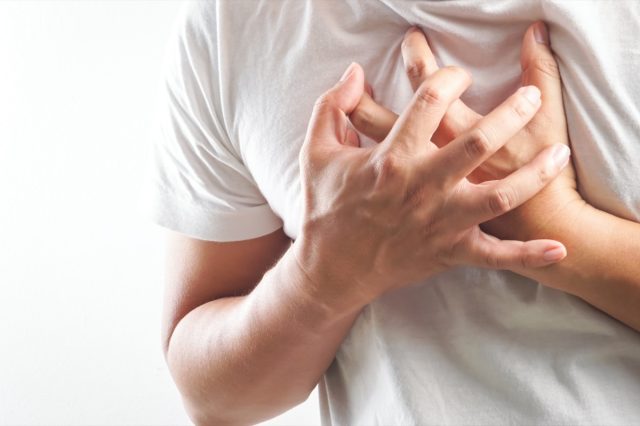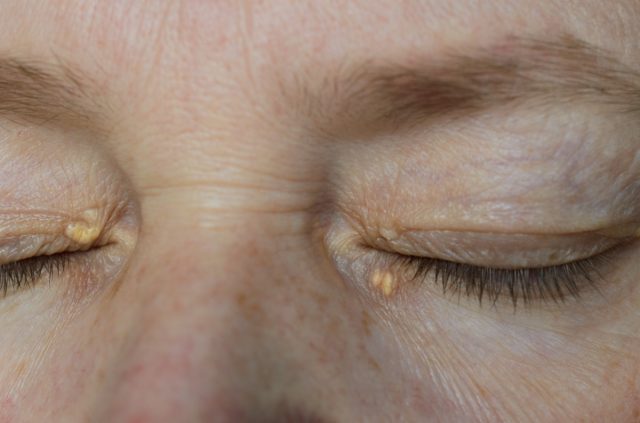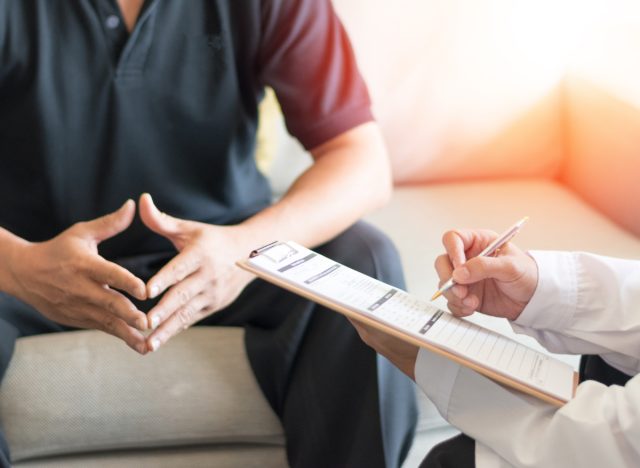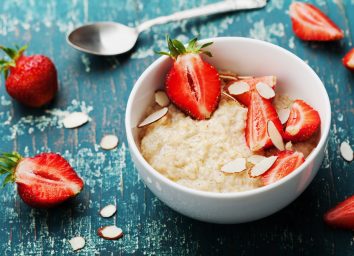Ugly Side Effects of Having High Cholesterol, Say Dietitians

Everyone has heard that you have to watch your cholesterol, but many only have a vague idea of what this substance even is.
"Cholesterol is a waxy substance made in the liver," says Johna Burdeos, RD. "Cholesterol helps protect nerves, make cell tissue, and certain hormones. It is also in foods—dairy products, eggs, and meat."
It's important to note the two types of cholesterol—low-density lipoprotein (LDL) cholesterol and high-density lipoprotein (HDL) cholesterol. Many refer to LDL cholesterol as the "bad" variety, due to the fact that this type builds up in your arteries and can cause a variety of problems, while HDL "good" cholesterol simply gets broken down and disposed of in your liver. High amounts of LDL cholesterol and low amounts of HDL cholesterol can cause a number of problems, especially if you leave these levels unchecked.
As high amounts of LDL cholesterol build up in your body, you can expect a variety of grotesque side effects. We consulted dietitians to find out exactly what you can expect if you have high levels of cholesterol in your body.
Then, for even more healthy tips, here are the Eating Habits to Lose Abdominal Fat As You Age, Say Dietitians.
Heart Attack

"When cholesterol levels are high, the extra cholesterol gets stored in the arteries and builds up over time into plaque, making it difficult for blood to flow properly through the arteries," says Burdeos.
Over time, the unchecked buildup of plaque leads to one of the most notorious side effects of high cholesterol.
"This can cause a heart attack or stroke. It is possible to not experience side effects from high cholesterol and some people don't know they've had high cholesterol until a life-threatening event occurs," says Burdeos. "This is why getting a routine check-up that includes a blood test for cholesterol levels is important."
Skin Growths

While cholesterol can cause a ton of internal side effects, not every symptom of high LDL levels stays on the inside.
"Unfortunately, most people who have high cholesterol levels will not know they have high cholesterol levels without having bloodwork done to tell them they have high cholesterol levels," says Dr. Dana Ellis Hunnes, PhD, MPH, RD, author of Recipe For Survival. "However, there are a couple of signs if you have high cholesterol. One is called: xanthomas which are soft, yellow growths on the skin."
A breakout of skin blemishes sounds horrible on a good day, but the underlying reason as to why you may experience this breakout makes matters much worse.
"Blood flow is impeded by the thick cholesterol that can pile up on the sides of blood vessels making them thinner and making blood thicker," says Dr. Ellis Hunnes.
Your diet can go a long way to improving your skin, and you can do your body a favor by indulging in 22 Foods That Will Immediately Improve Your Skin, According to Dermatologists.
Male Impotence

Men with high cholesterol have to stay extra vigilant, as too much LDL cholesterol can stop you from starting a family. "Another potential sign is impotence in men because the blood vessels that lead to the penis can become occluded (blocked) from high cholesterol levels," says Dr. Ellis Hunnes. "But for the most part, most people would not know without a blood test."
Luckily, anyone looking to avoid this symptom can take some crucial steps early to ensure they don't face impotence.
"There are many ways, through healthy diet and nutrition that can naturally help lower cholesterol levels. This includes, first and foremost, a whole-foods, plant-based diet that is high in fiber. The fiber helps lower cholesterol levels, and the lack of animal proteins, which are inflammatory, can also help lower cholesterol levels, total cholesterol, and LDL cholesterol. Exercise, especially vigorous exercise, can help increase HDL (healthier) cholesterol levels."
Arterial Damage

"High levels of cholesterol are associated with atherosclerosis (hardening of the arteries) and coronary heart disease," says Reda Elmardi, RD, CN, owner of The Gym Goat. "Atherosclerosis is caused by plaque build-up inside the arteries that narrows them and reduces blood flow. This causes symptoms like chest pain, shortness of breath, and irregular heartbeat."
This symptom can lead to a number of other negative health factors. By keeping track of your cholesterol, you can dodge a variety of issues that stem from damaged arteries.
Stroke

If you let your cholesterol levels get too high and experience copious amounts of arterial damage, you might suffer a stroke.
"Strokes occur when a blood clot forms in the brain and cuts off the oxygen supply to the brain," says Elmardi. "Stroke symptoms include sudden numbness or weakness on one side of the body, confusion, trouble speaking, vision problems, and loss of balance or coordination."
Like many other symptoms, diet can play a crucial role in staving off a stroke. By incorporating Foods That Help Stave Off Strokes After 40 into your diet, you can reduce your chances of experiencing this serious symptom.
Diabetes

If you leave your bad cholesterol levels unchecked, you might just end up contracting diabetes.
"Diabetes occurs when the pancreas does not produce enough insulin or when cells do not respond properly to insulin," says Elmardi. "Insulin helps control sugar levels in the blood. If you have type 1 diabetes, you cannot make any insulin at all. Type 2 diabetes usually results from being overweight or having too much fat around your middle. People who have type 2 diabetes often have high cholesterol levels."
"High levels of cholesterol are not always harmful. Some people have higher than average amounts of cholesterol in their bodies," Elmardi continues. "These people usually have no symptoms. Other people who have high cholesterol often experience symptoms. Symptoms include chest pain, shortness of breath, irregular heartbeat, and leg swelling. People who have these symptoms should talk to their doctor about possible treatment options."









